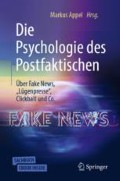Zusammenfassung
„Wir glauben an die Meinungsfreiheit und sind überzeugt davon, dass jeder einzelne Mensch die Welt beeinflussen kann“. Das hier zitierte Werteversprechen von Twitter, einem der größten sozialen Onlinenetzwerke der Welt, klingt beeindruckend. Doch sind tatsächlich nur reale menschliche Twitter-User für die Informationsverbreitung und Stimmungsbilder auf der populären Plattform verantwortlich? Erhebungen über den US-Präsidentschaftswahlkampf im Jahr 2016 deuten in eine andere Richtung.
Access this chapter
Tax calculation will be finalised at checkout
Purchases are for personal use only
Literatur
Bessi, A., & Ferrara, E. (2016). Social bots distort the 2016 us presidential election online discussion. First Monday, 21, 1–14.
Bruter, M., & Harrison, S. (2016). The impact of Brexit on consumer behaviour [Report]. https://www.lansons.com/download-brexit-report-2.
Davis, C. A., Varol, O., Ferrara, E., Flammini, A., Menczer, F. (2016). BotOrNot. A system to evaluate Social Bots. In Proceedings of the 25th international conference companion on world wide web (S. 273–274). International World Wide Web Conferences Steering Committee.
Deb, A., Majmundar, A., Seo, S., Matsui, A., Tandon, R., Yan, S., et al. (2018). Social bots for online public health interventions. In 2018 IEEE/ACM International Conference on Advances in Social Networks Analysis and Mining (ASONAM).
Dechêne, A., Stahl, C., Hansen, J., & Wänke, M. (2010). The truth about the truth: A meta-analytic review of the truth effect. Personality and Social Psychology Review, 14, 238–257.
Edwards, C., Edwards, A., Spence, P., & Ashleigh, K. (2014). Is that a bot running the social media feed? Testing the differences in perceptions of communication quality for a human agent and a bot agent on Twitter. Computers in Human Behavior, 33, 372–376.
Ferrara, E., Varol, O., Davis, C., Menczer, F., & Flammini, A. (2016). The rise of social bots. Communications of the ACM, 59, 96–104.
Guilbeault, D. (2016). Growing bot security: An ecological view of bot agency. International Journal of Communication, 10, 5003–5021.
Hegelich, S. (2016). Invasion der Meinungs-Roboter (Konrad Adenauer Stiftung – Analysen und Argumente, 221). http://www.kas.de/wf/doc/kas_46486-544-1-30.pdf?161222122757.
Howard, P. N., & Kollanyi, B. (2016). Bots, #StrongerIn, and #Brexit: Computational Propaganda during the UK-EU Referendum [RESEARCH NOTE 2016.1].
Kind, S., Jetzke, T., Ehrenberg-Silies, S., Bovenschulte, M., & Weide, S. (2017). Social Bots. TA-Vorstudie. Büro für Technikfolgen-Abschätzung beim Deutschen Bundestag (Hrsg.). https://www.tab-beim-bundestag.de/de/aktuelles/20161219/Social%20Bots_Thesenpapier.pdf.
Koerth, K. (18. Juli 2018). Alle miteinander haben wir Terror gemacht. http://www.spiegel.de/kultur/kino/amoklauf-von-muenchen-wie-die-terrorangst-entstand-dokumentation-a-1218229.html.
Kollanyi, B., Howard, P. N., & Woolley, S. C. (2016). Bots and automation over Twitter during the first US presidential debate. COMPROP Data Memo, 1, 1–4.
Lee, K., Palsetia, D., Narayanan, R., Patwary, M. D. M. A., Agrawal, A., & Choudhary, A. (2011). Twitter trending topic classification. In L. O’Conner (Hrsg.), 2011 11th IEEE international conference on data mining workshops (S. 251–258).
Parmar, B. (2012). Protecting against spear-phishing. Computer Fraud & Security, 1, 8–11.
Pew Research Center. (Dezember 2016). Many americans believe fake news is sowing confusion [Report]. http://www.journalism.org/2016/12/15/many-americans-believe-fake-news-is-sowing-confusion.
Pew Research Center. (Oktober 2018). Social media bots draw public’s attention and concern [Report]. http://www.journalism.org/2018/10/15/social-media-bots-draw-publics-attention-and-concern.
Ross, B., Brachten, F., Stieglitz, S., Wikstrom, P., Moon, B., Münch, F., & Bruns, A. (2018). Social bots in a commercial context – A case study on soundcloud. In Association for Information Systems.
Schanze, R. (07. Juni 2017). Was ist ein Algorithmus? – Einfach erklärt. https://www.giga.de/extra/ratgeber/specials/was-ist-ein-algorithmus-einfach-erklaert.
Shao, C., Ciampaglia, G. L., Varol, O., Yang, K. C., Flammini, A., & Menczer, F. (2018). The spread of low-credibility content by social bots. Nature Communications, 9, 4787.
Stieglitz, S., Brachten, F., Berthelé, D., Schlaus, M., Venetopoulou, C., & Veutgen, D. (Juli 2017a). Do social bots (still) act different to humans? – Comparing metrics of social bots with those of humans. In International conference on social computing and social media (S. 379–395). Springer, Cham.
Stieglitz, S., Brachten, F., Ross, B., & Jung, A. K. (2017b). Do social bots dream of electric sheep? A categorisation of social media bot accounts. In Australasian conference on information systems. Hobart, Tasmanien.
Subrahmanian, V. S., Azaria, A., Durst, S., Kagan, V., Galstyan, A., Lerman, K., Zhu, L., Ferrara, E., Flammini, A., & Menczer, F. (2016). The DARPA Twitter bot challenge. Computer, 49, 38–46.
Unsere Werte. (o. D.). https://about.twitter.com/de/values.html.
Unz, D. (2016). Kultivierung (Cultivation of beliefs). In N. C. Krämer, S. Schwan, D. Unz, & M. Suckfüll (Hrsg.), Medienpsychologie: Schlüsselbegriffe und Konzepte (2. Aufl., S. 225–233). Stuttgart: Kohlhammer.
Veale, T., Valitutti, A., & Li, G. (2015). Twitter: The best of bot worlds for automated wit. In Distributed, ambient, and pervasive interactions (S. 689–699).
Woolley, S. C. (2016). Automating power. Social bot interference in global politics. First Monday, 21. http://firstmonday.org/article/view/6161/5300.
Woolley, S. C., & Howard, P. N. (2016). Political communication, computational propaganda, and autonomous agents. International Journal of Communication, 10, 4882–4890.
Author information
Authors and Affiliations
Editor information
Editors and Affiliations
Rights and permissions
Copyright information
© 2020 Springer-Verlag GmbH Deutschland, ein Teil von Springer Nature
About this chapter
Cite this chapter
Neis, M., Mara, M. (2020). Social Bots – Meinungsroboter im Netz. In: Appel, M. (eds) Die Psychologie des Postfaktischen: Über Fake News, „Lügenpresse“, Clickbait & Co.. Springer, Berlin, Heidelberg. https://doi.org/10.1007/978-3-662-58695-2_17
Download citation
DOI: https://doi.org/10.1007/978-3-662-58695-2_17
Published:
Publisher Name: Springer, Berlin, Heidelberg
Print ISBN: 978-3-662-58694-5
Online ISBN: 978-3-662-58695-2
eBook Packages: Psychology (German Language)

